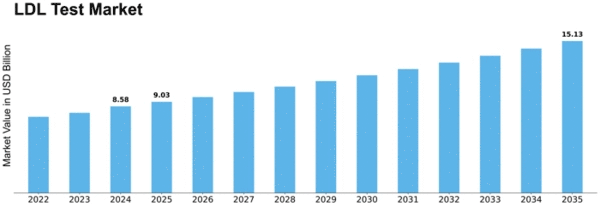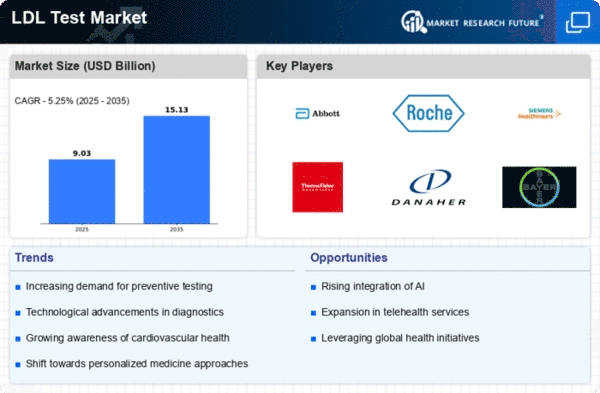Ldl Test Size
LDL Test Market Growth Projections and Opportunities
The LDL test market is influenced by several key factors that drive its growth and development. Firstly, the rising prevalence of cardiovascular diseases (CVDs) worldwide contributes significantly to the expansion of the LDL test market. Elevated levels of low-density lipoprotein (LDL) cholesterol, often referred to as "bad" cholesterol, are a major risk factor for CVDs such as coronary artery disease, stroke, and peripheral artery disease. As the incidence of these conditions continues to rise globally, there is a growing demand for accurate and reliable LDL testing to assess cardiovascular risk and guide treatment decisions. This increasing disease burden drives the adoption of LDL tests, stimulating market growth.
Secondly, growing awareness about the importance of cholesterol management and preventive healthcare measures also fuels market expansion. Healthcare organizations and governments worldwide are actively promoting initiatives to raise awareness about the risks associated with high LDL cholesterol levels and the benefits of early detection and intervention. Public health campaigns, educational programs, and screening initiatives play a crucial role in encouraging individuals to undergo LDL testing as part of routine health assessments. This increased awareness leads to greater demand for LDL tests, driving market growth.
Furthermore, advancements in diagnostic technologies and the introduction of innovative LDL testing methods contribute to market expansion. Manufacturers are continuously developing new and improved LDL testing assays, instruments, and platforms that offer enhanced sensitivity, specificity, and accuracy. These technological innovations enable healthcare providers to obtain more precise LDL cholesterol measurements, thereby improving risk assessment and treatment monitoring for patients with or at risk of CVDs. The availability of advanced LDL testing solutions drives market growth by meeting the evolving needs of healthcare professionals and patients.
Moreover, demographic trends such as aging populations and lifestyle changes also influence the LDL test market. As the global population ages, there is a higher prevalence of age-related risk factors for CVDs, including dyslipidemia and hypertension. Additionally, changes in lifestyle factors such as unhealthy diet habits, physical inactivity, and smoking contribute to the development of dyslipidemia and other cardiovascular risk factors. These demographic and lifestyle trends increase the demand for LDL testing as part of comprehensive cardiovascular risk assessment strategies, thereby driving market growth.
Additionally, government regulations and healthcare policies play a significant role in shaping the LDL test market landscape. Regulatory agencies worldwide establish guidelines and quality standards for the development, manufacturing, and use of LDL testing products to ensure their safety, efficacy, and accuracy. Compliance with these regulations is essential for manufacturers to obtain regulatory approvals and market their LDL testing products. Moreover, reimbursement policies and coverage decisions by government healthcare programs and private insurance providers influence the accessibility and affordability of LDL testing for patients, impacting market dynamics.
On the other hand, challenges such as cost constraints and access barriers may hinder market growth. LDL testing can be expensive, particularly for individuals without adequate insurance coverage or access to healthcare services. Moreover, disparities in healthcare infrastructure and resources in certain regions may limit the availability and accessibility of LDL testing, especially in underserved communities. Addressing these challenges through initiatives to improve healthcare affordability, expand access to diagnostic services, and enhance healthcare infrastructure is essential to unlock the full potential of the LDL test market.



















Leave a Comment